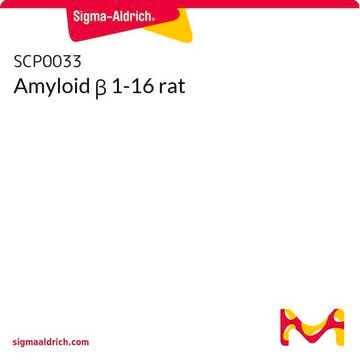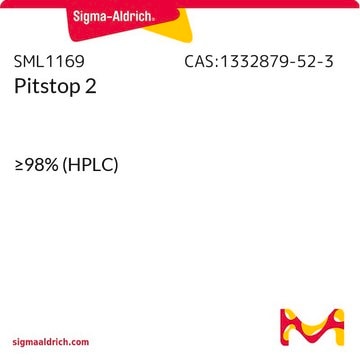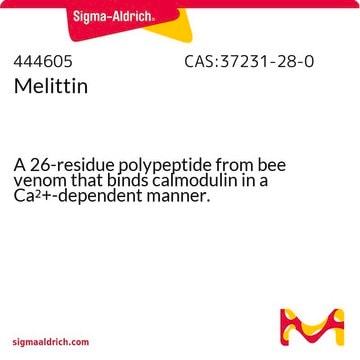SCP0036
Amyloid β 13-16 human
≥95% (HPLC)
Sinónimos:
HHQK
Iniciar sesiónpara Ver la Fijación de precios por contrato y de la organización
About This Item
Fórmula empírica (notación de Hill):
C23H36N10O6
Peso molecular:
548.60
UNSPSC Code:
12352200
NACRES:
NA.32
Productos recomendados
assay
≥95% (HPLC)
form
lyophilized
composition
Peptide Content, ≥45%
storage condition
protect from light
storage temp.
−20°C
Amino Acid Sequence
His-His-Gln-Lys
Application
Amyloid β (Aβ) refers to peptides derived from Amyloid precursor protein that vary in length from 36-43 amino acids. Aβ(s) peptides, their peptide fragments and mutated fragments are used to study a wide range of metabolic and regulatory functions including activation of kinases, regulation of cholesterol transport, function as a transcription factor, and regulators of inflammation. Aβ(s) peptides and their peptide fragments are also used to study oxidative stress, metal binding and mechanisms of protein cross-linking in the context of diseases such as Alzheimer′s disease and neurodegeneration. HHQK is a studied as a unique target site for inhibition of amyloid fibril formation and proteoglycan binding.
Storage Class
11 - Combustible Solids
flash_point_f
Not applicable
flash_point_c
Not applicable
Elija entre una de las versiones más recientes:
Certificados de análisis (COA)
Lot/Batch Number
¿No ve la versión correcta?
Si necesita una versión concreta, puede buscar un certificado específico por el número de lote.
¿Ya tiene este producto?
Encuentre la documentación para los productos que ha comprado recientemente en la Biblioteca de documentos.
D Giulian et al.
The Journal of biological chemistry, 273(45), 29719-29726 (1998-10-29)
The beta-amyloid peptide 1-42 (Abeta1-42), a major component of neuritic and core plaques found in Alzheimer's disease, activates microglia to kill neurons. Selective modifications of amino acids near the N terminus of Abeta showed that residues 13-16, the HHQK domain
J McLaurin et al.
European journal of biochemistry, 267(21), 6353-6361 (2000-10-13)
One of the major clinical features of Alzheimer's disease is the presence of extracellular amyloid plaques that are associated with glycosaminoglycan-containing proteoglycans. It has been proposed that proteoglycans and glycosaminoglycans facilitate amyloid fibril formation and/or stabilize these aggregates. Characterization of
Toshio Ariga et al.
Journal of neuroscience research, 88(11), 2303-2315 (2010-07-14)
The extracellular accumulation of amyloid beta proteins (Abetas) in neuritic plaques is one of the hallmarks of Alzheimer's disease (AD). The binding of Abetas to extracellular membranes (ECMs) is a critical step in developing AD. Abetas bind to many biomolecules
Nuestro equipo de científicos tiene experiencia en todas las áreas de investigación: Ciencias de la vida, Ciencia de los materiales, Síntesis química, Cromatografía, Analítica y muchas otras.
Póngase en contacto con el Servicio técnico![[Glu11]-Amyloid β 10-16 human ≥95% (HPLC)](/deepweb/assets/sigmaaldrich/product/images/253/004/4be4057f-fdb4-45f6-950a-d1b2774044c1/640/4be4057f-fdb4-45f6-950a-d1b2774044c1.jpg)


![[Ala28]-Amyloid β 25-35 ≥95% (HPLC)](/deepweb/assets/sigmaaldrich/product/images/306/938/dd9f7c72-cfca-4ea3-8e10-a7a2a7994639/640/dd9f7c72-cfca-4ea3-8e10-a7a2a7994639.jpg)





